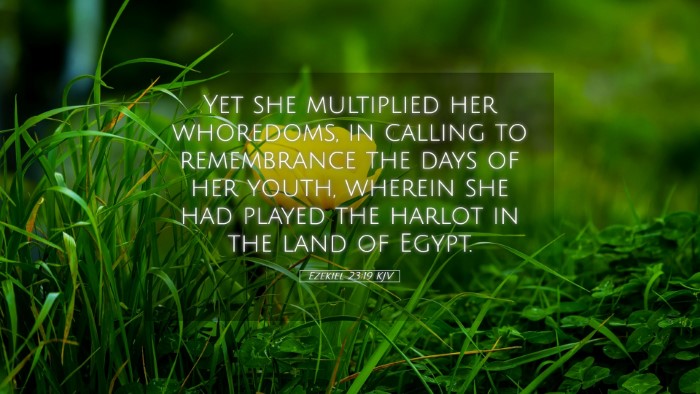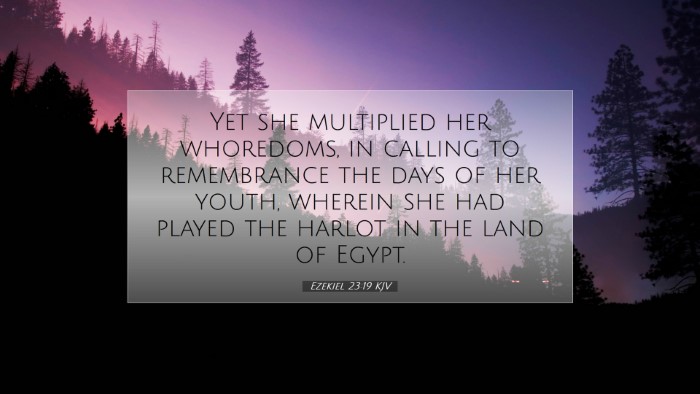This verse comes from a rich prophecy delivered by Ezekiel, portraying the unfaithfulness of Israel through the metaphor of two sisters, Oholah and Oholibah, representing Samaria and Jerusalem respectively. In this context, we see a detailed analysis of spiritual infidelity and the consequences thereof.
Contextual Analysis
The backdrop of this verse is critical for understanding the profound lamentation of God over His people. Historically, the people of Israel were in the midst of a cultural and spiritual crisis, heavily influenced by the nations around them.
Implicit Themes
- Reminder of Past Sin: The phrase "calling to remembrance the days of her youth" signifies a nostalgia not for past glories, but for sinful indulgences of their early days in Egypt.
- Multiplication of Whoredoms: This phrase stresses the idea that their unfaithfulness has expanded and deepened, moving beyond mere physical betrayal into a spiritual depravity.
- Continuation of Idolatry: Alluding to their time in Egypt draws attention to the idolatries they adopted, indicating that the heart's inclination towards false gods did not merely remain a relic of the past.
Insights from Commentators
Matthew Henry
Henry emphasizes that this recollection symbolizes a regretful return to sin. He states that the past should be a guide for the present, warning us of the dangers that come with a seductive memory of former pleasures that are ultimately unholy and destructive.
Albert Barnes
Barnes highlights the "whoredoms" as metaphors for idolatry, drawing a parallel between Israel's physical infidelity to her gods and the spiritual betrayal against Yahweh. He cautions against the allure of remembering sinful times fondly, suggesting that such memories can lead to a rekindling of old sins and faithlessness toward God.
Adam Clarke
Clarke approaches the verse with an emphasis on the historical context of Israel's pagan practices. He notes that the reference to Egypt is intentional, as it reminds the Israelites of the depravity they experienced there, suggesting that their longing to return to those times signifies an oblivion to the deliverance God provided.
Theological Implications
- Spiritual Adultery: This metaphor of whoredom serves as an admonition for all believers regarding loyalty to God. It illustrates how spiritual infidelity is often subtle and starts with a fond recollection of past sin.
- God’s Grief: The emotional weight of this verse reflects the profound grief of God over His unfaithful people, emphasizing His desire for a committed relationship with them.
- Historical Pattern: The cyclical pattern of rebellion against God can be observed throughout Scripture. This passage serves as a reminder of the need for vigilance and the dangers of nostalgia that can lead to spiritual demise.
Application for Today’s Believers
The message of Ezekiel 23:19 transcends its historical context and continues to speak to Christians today. Believers are admonished to examine their own lives, identifying any 'Egypts' they may long to return to, understanding what such longings may reveal about their spiritual condition.
Conclusion
In this verse, Ezekiel encapsulates a poignant reflection on Israel's past that remains relevant for contemporary faith journeys. Through careful study of this scripture, and utilizing insights from esteemed commentators, one can comprehend the deep spiritual truths contained within. Reflecting on past infidelities should lead to repentance and a renewed commitment to fidelity to God, the ultimate source of grace and mercy.


